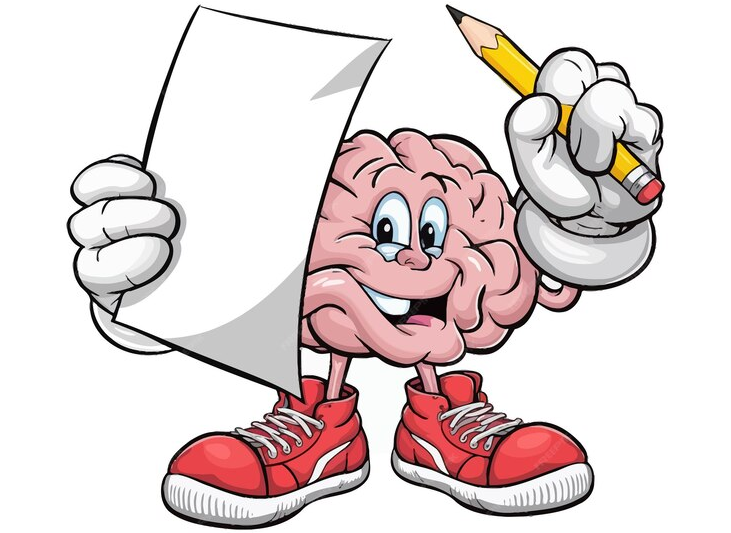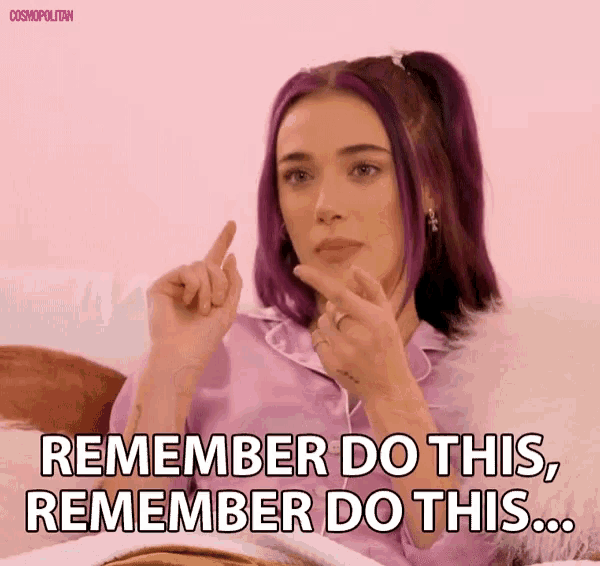How to make your brain work at full capacity: 13 Practical tips
-
Larisa Shishkova
Copywriter Elbuz
Eight in the morning. Coffee, computer and the feeling that the brain is still sleeping. Sound familiar? Have you ever thought that your brain can work at 100%? Imagine that the smallest tasks are solved in the blink of an eye, and complex projects are implemented easily and quickly. Sounds like fantasy? But it's real. Here are 13 ways to help you unleash your brain's full potential - read on and discover the secrets to its effectiveness!

Glossary
- ✨ Efficient brain function - A state in which the brain uses its resources as productively as possible to complete tasks.
- 😴 Get enough sleep - Regular sleep of at least 7-8 hours is necessary for recovery and optimal brain function.
- 🎯 Set up for work - Mental preparation, organization of work space and set up to complete tasks.
- 🛡 Information filtering - The process of selecting and processing only the necessary data and ignoring unnecessary information.
- 🧘 Mindfulness training - Practices aimed at improving concentration and awareness of the present moment (for example, meditation).
- 🎭 Multitasking - The ability to effectively perform several tasks simultaneously without compromising their quality.
- 🧩 Intuition - The ability to make decisions and draw conclusions based on an internal feeling without logical justification.
- 🚀 Do, don't think - A principle calling for immediate action to avoid procrastination.
- 📒 Recording Information - Capture important data in a notebook, paper, or digital format for improved memorization and organization.
- 🧠 Memorizing Lists - Various techniques, such as the use of mnemonics, to improve memory and the speed of remembering information.
- 🔄 Considering alternatives - The ability to see and analyze different ways to solve a problem or complete a task.
- ❓ Doubt - The ability to critically evaluate yourself, your actions and decisions in order to find more effective options.
- 🔍 Troubleshooting - Analysis of incorrect actions and search for improvements to prevent their recurrence in the future.
- 🌟 Dreams and Imagination - Using dreams and fantasies to stimulate the creative process and find innovative solutions.
Method #1: Improve the quality of your sleep
How long has it been since you felt truly rested after sleep? I have been convinced many times that quality sleep is one of the fundamental factors influencing our productivity and mental abilities. It is simply impossible for the mind to work 100% without proper sleep.

In practice, I have identified several steps that help me improve my sleep:
Relaxing Bath Before Bed
Before bed, I often take a warm, relaxing bath with aromatic oils. 🛀 This ritual helps relieve tension after a hard day and prepare the body for rest. I am convinced that aromatherapy plays an important role in this process.
Warm milk or tea with honey
Through my own experience, I have found that a cup of warm milk or tea with honey has amazing benefits calming effect. 🥛🍯 This not only lulls you to sleep, but also helps you get ready for sleep.
Maintaining biorhythms
Going to bed and getting up according to the natural biological cycle is an equally important aspect. For example, if you are a night owl, allow yourself to go to bed later and wake up later. I firmly believe it improves sleep quality and overall well-being.
Consultation with a doctor
In difficult cases, when none of the mild methods help, I recommend consulting a doctor. Simple advice from a specialist can help identify and solve the problem much faster than trying on your own. 💊

Minimizing stress
It is also important to minimize stress before bed. I became acquainted with mindfulness and yoga techniques that help reduce anxiety and promote better sleep.
Specialized medications
In exceptional cases, when insomnia becomes chronic, I can recommend discussing with your doctor the prescription of special medications. However, this should be a last resort, only after consulting a professional.
"A healthy sleep should last at least 7 hours. But the most important thing is the quality of sleep, not its quantity." — Dr. Irina Solovyova, sleep specialist.
Final Review
| Positive practices 💡 | Practices to follow avoid ❌ |
|---|---|
| Relaxing bath 🛀 | Working with gadgets before bedtime 📱 |
| Warm tea or milk ☕ | Late meals 🍔 |
| Jet lag 🌙 | Nightly parties 🎉 |
| Consultation with a doctor 📋 | Self-medication 💊 |
| Relaxation techniques 🧘♂️ | Caffeine before bed ☕ |
I hope these simple yet effective tips will help you improve your sleep and boost your brain performance. Try it and share your success!
Now that you know how important it is to take care of the quality of your sleep, I am confident that your mental performance will be at its best every day!
Method number 2: Set yourself up for productive work
My morning, like many of you, begins with hardly pleasant thoughts about the coming day: endless meetings, complex business negotiations, constant showdowns with employees. But before I plunged into this whirlpool of tasks, I mastered one simple but very effective ritual that helps me set myself up for success.
Every morning, before starting work, I devote 10-15 minutes to meditation. No, I don’t sit in the lotus position and recite mantras. Everything is much simpler: I close my eyes, relax and direct my thoughts to pleasant events. At these moments, I like to imagine my successes in business negotiations and successful conceptual discussions with colleagues.

😀 After these meditative minutes, I feel much calmer and more confident. A good addition to this practice is a cup of chamomile tea or strong coffee, depending on what I prefer at the moment.
✔️ The main benefits of this meditation:
Increased concentration and focus on the tasks of the day. Reduced stress and fatigue. Improved emotional state.
🍀 Some recommendations for those who want to try:
- 🧘 Meditation Process: Find a quiet place where you will not be disturbed. Sit comfortably, close your eyes and focus on your breathing. This will help you take your mind off everyday worries and get into a working mood.
- ☕️ Drink of choice: Prepare chamomile tea or strong coffee. This will not only give you energy, but also create a sense of morning ritual that will put you in a positive mood.
From personal experience, I can say that this small morning ritual has significantly improved my performance. I am more focused and productive, and my business meetings are at a higher level.

📊 Table: What is useful and what is not for brain function
| Useful practices | Undesirable actions |
|---|---|
| Meditation | Skip breakfast |
| Chamomile tea | Excess caffeine |
| Planning your day | Disorganized |
Bottom line: small changes to your morning routine can make a big difference in your well-being and productivity throughout the day. Try to implement my recommendations into your daily life and you will see how your brain starts working at 100%.

Now that you have this simple yet effective tool, I'm confident that your business negotiations and work tasks will be much more successful. Set yourself up for victory and make morning meditation a regular part of your day.
Method #3: Manage the information you absorb
Everyone We are surrounded by a huge amount of information every day, and I learned how to filter it correctly. The Internet, social networks, live communication - all this can be both useful and distracting. When I realized that my productivity was starting to suffer due to constantly checking the news, I decided to introduce strict limits.

Defining values and priorities
The first thing I did was highlight important and priority points for myself. For example:
- 🕰️ I limited my time on social networks - I only logged in in the morning and evening, an hour a day.
- 📧 Checking mail - I had a habit of checking it every minute. I started checking my email twice a day.
- 📵 Focus on real tasks - at work and in my personal life, I highlighted important tasks and narrowed my circle of contacts.
Fear of losing an important message
I'm sure many people are afraid of missing an important message or update . But I can assure you that the world will not collapse because you read an important letter in the evening, and not right away. If something is truly urgent, they will call you.
🚀 Result: Thanks to this focused approach, I began to get a lot more done and was less distracted by the routine. My stress level has decreased significantly and my productivity has increased.

Useful and unhelpful methods:
| Useful techniques | Unhelpful steps |
|---|---|
| ⏰ Online time limit | ❌ Constantly checking the news |
| 📊 Priority to important tasks | ❌ Distraction by unimportant conversations |
| 📝 Making a to-do list | ❌ Lack of planning |
| 📵 Minimizing external distractions | ❌ Spend time aimlessly on the Internet |
I truly believe that control over the information you consume is the key to high performance and personal effectiveness. You may also find other recommendations on our site useful, such as the article on how to find new suppliers.
Method number 4: Improving concentration: train your attention
Nowadays, when multitasking has become the norm, we often have to deal with absent-mindedness and lack of attention. I found an effective way to deal with this and am sharing my experience with you.
Practical exercise to improve concentration
Every day for several months I set aside 10-15 minutes for a simple exercise: I sat down, closed my eyes and did nothing. I concentrated on my own breathing, making every inhalation and exhalation conscious. ⛅
This exercise is similar to working out in the gym. Imagine that you are pumping one specific muscle. You will also develop your attention. At first it seems difficult to concentrate, but every day it gets easier. I noticed that I began to notice the smallest details that had simply slipped away before.

Useful life hacks
📌 I have also integrated several other healthy habits into my life such as:
- 🏃♀️ Physical activity: Regular walks and exercise help me improve my brain activity.
- 📖 Reading books: Stimulates my mind and enriches my concentration.
- 📩 Making To-Do Lists: This helps me stay focused on the important tasks and not get scattered.
Not only do these simple tips help me pay attention, but they have greatly improved my productivity at work.
Scientific Evidence
Research has shown that the practice of mindful breathing and meditation can improve brain functions related to attention, memory and learning ability. 🤓
"Meditation is a surprisingly powerful tool for managing attention and reducing stress," says neuroscientist Sarah Lazar of Harvard Medical School.
Active implementation in my practice
Real life example
When I started using these methods, I was convinced of their effectiveness from my own experience. One striking example is the successful completion of a complex project at work. Thanks to improved concentration, I was able to quickly find innovative solutions and negotiate at the highest level. This brought benefits to both me and the company.
Review of the usefulness of methods
| Useful actions | Undesired actions |
|---|---|
| Breathing exercises | Constant distractions by small things |
| Physical activity | Passive rest |
| Reading books | Aimless internet surfing |
| To-Do Lists | Spontaneous Resolutions |
Summary
I am convinced that a comprehensive approach to focusing brings significant benefits. These simple but effective techniques will help you improve your memory, attention, and overall cognitive ability. Apply these tips and see their effectiveness from your own experience.
Method #5: Developing Multitasking Skills
Multitasking is a critical skill for any entrepreneur who faces many different challenges every day. After all, when you run a business, you have to simultaneously think about new products, renting premises, finding new suppliers and much more. This can really cause stressful situations. I can confidently say that managing multitasking effectively has truly improved my productivity.
So, how did I develop this skill?
1. Focus on priorities
The first step was to identify the main tasks. 🚀 I set aside time at the beginning of the day to make a to-do list and rank them by importance. Having learned to focus on key tasks, I began to solve them, and only then move on to less urgent issues.

2. Ability to delegate tasks
Delegation is an important aspect of multitasking. I realized that I couldn’t do everything myself, and began to delegate some of the tasks to reliable employees. This allowed me to focus on strategically important decisions.
3. Switching between tasks
The next steps involved skillfully switching between tasks. 🔄 I found the ideal time interval for myself of 25-30 minutes, after which I switched to another task. This allowed me to keep my mind fresh and focused.
4. Using time management tools
Planners and mobile applications have become my faithful assistants. 📅 I systematically use tools like Trello or Asana to help me remember important meetings and deadlines.
5. Constant learning and self-development
Constant learning is important for developing multitasking. 📚 I always try to find time to read new books and articles on the topic of productivity and time management. 
Here are a few recommendations that I can confidently offer:
✔️ Helpful
- 📝 Determining priority tasks
- 👥 Delegating responsibilities
- ⏰ Using time slots for work
- 📱 Using scheduling tools
- 📖 Self-education and training
❌ Not recommended
- ❌ Doing all tasks at once without prioritizing
- ❌ Neglecting delegation
- ❌ Constantly switching tasks without a system
- ❌ Not following a daily routine
- ❌ Ignoring learning opportunities
🔍 I am convinced that following these simple principles of multitasking can greatly improve your productivity in your daily activities. Don't be afraid to try new methods and always be open to self-development.
Method #6: Listen to your intuition
Intuition is an amazing tool that I always try to use in my professional activities. Many decisions made based on intuition have brought me amazing results. For example, I once met with a potential partner, and although at first glance he seemed ideal for cooperation, an inner voice told me to be more careful. As a result, when I decided to study his track record more deeply, it turned out that my doubts were not in vain. My intuition saved me from a dubious agreement and potential problems.

I am convinced that intuition is a powerful resource that should not be ignored. It is what allows our brain to process a huge amount of information and make quick conclusions, often much faster and more accurately than conscious thinking. For example, when I participated in large projects, intuition more than once saved me from wrong steps.
🤔 How I used intuition in my practice:
📝 I always paid attention to first impressions when meeting new people or potential partners.
🔍 If I intuitively felt that something was wrong, I conducted a thorough study and checked the information.
📈 She relied on intuition when making strategic decisions, which allowed her to avoid serious mistakes.
However, I advise making decisions not only based on intuition. Sometimes it can be misleading, especially if emotions play a primary role. It is important to combine its signals with logical analysis and factual data.
"Intuition rarely deceives us, but when it does, the consequences can be serious." — George Soros.
For a more balanced approach, I recommend using intuition as an additional filter, checking it with internal and external data. For example, when making an important decision, analyze the facts and then ask yourself what your inner voice tells you.
Table of useful and harmful practices
| Good practice | Bad practice |
|---|---|
| Listen to the first reaction and then analyze | Completely ignore intuitive signals |
| Use intuition combined with facts | Blindly trust intuition without checking |
| Test intuitions with facts and research | Rely entirely on intuition without logical analysis |
I advise you to pay attention to your internal sensations and use them to improve the efficiency of your brain. Intuition can become a reliable assistant in your professional activities if you use it correctly and carefully.
Method #7: Make quick decisions in critical situations
When time is against us, thinking can become our enemy. I have repeatedly encountered situations where a moment of delay could affect the outcome of an event. In such moments, it is important not to think, but to act.

How I approached the problem
While working on one of my major event projects, we were under tremendous stress due to a sudden supplier failure. We didn't have time to think twice, so I decided to immediately contact the backup supplier. In this case, without having time to think, I simply acted on autopilot, using a pre-prepared plan.
What strategies have worked for me
I believe that a well-designed action plan is the key to successfully solve unexpected problems. In my practice, I always try to anticipate possible stressful situations and have a ready-made plan for solving them. Here are some tips that helped me:
- 💡 Make a list of potential problems: Identify the most likely problems you may encounter in your work or life.
- 📝 Develop an action plan for each problem: Describe clear steps to take if each problem occurs .
- ⏳ Practice making quick decisions: Be sure to practice making decisions without much thought. This can be done by embedding quick solutions into simple everyday tasks.
- 🌟 Assess the risks: Assess the possible consequences and degree of risk to understand when it is really worth acting without delay.
Example from my practice
Once, during a major event to promote a new product , our Internet connection suddenly disappeared an hour before the start. We were expecting VIP guests and an online presentation, and then the Internet went out! At that moment, I realized that thinking was only delaying time. Thanks to a pre-prepared plan, I immediately called our provider and at the same time organized backup Wi-Fi through mobile devices. This allowed us to quickly and smoothly hold the event.

Review of useful recommendations
| Good practices | Bad practices |
|---|---|
| 💎 Making Backup Plans | ❌ Rely on Improvisation |
| 🧠 Quick Thinking Training | ❌ Long thought at critical moments |
| 📋 List of potential problems | ❌ Ignoring possible risks |
I I am confident that quick decisions in critical situations require preparedness and a clear structure of actions. These practices and techniques have helped me get out of difficult situations with success more than once. Try and implement them into your daily activities - it will increase your confidence and efficiency.
Method #8: Record information
Record information , even the smallest detail, has proven its effectiveness and for me it turned out to be an immutable rule. I can confidently say that even if you are confident in your memory, it is still worth taking notes to increase your productivity. For example, in a recent project, when it was necessary to collect data for a complex report, I used this technique, and it completely justified itself.

I have found that by writing down information by hand or on the computer, I engage motor activity of the brain. 📝 This is incredibly important because our nervous system is activated, thereby increasing brain activity. Thanks to this, memorization and processing of information is enhanced.
Here are some tips that I think might be helpful:
- 📋 Write in a notebook: Manual writing has a strong effect on the brain, making it work more actively.
- 💻 Use electronic tools: Note-taking apps on your computer or phone can be a great addition.
- 🧠 Rewriting: Rewriting information helps to better assimilate it and consolidate it in memory.
- 📊 Create visual notes: Pictures, charts, and tables help you visualize data and remember it better.
I can give a specific example: in one of my projects I had to organize a large number of data on effective leadership methods for training. Once I started writing down all the ideas and data in a notebook, it became much easier to structure the information, compile it and prepare teaching materials. Now I often recommend to colleagues and students to use this method in their daily work.
Using the writing method, you will not only improve your productivity, but also significantly strengthen your memory and concentration.

To summarize:
| What's good to do | What's not to do do |
|---|---|
| 📒 Write by hand | 🤔 Rely on Memory |
| 📱 Use Notes Apps | 🚫 Consider it unnecessary |
| 🔄 Rewrite important points | ❌ Neglect documenting information |
| 📈 Take visual notes | 📉 Do not structure data |
I am convinced that using these methods will significantly improve your mental productivity. Try it and see for yourself!
Method #9: Memorize lists
One of The most effective skill I've learned to increase productivity is the ability to memorize lists. There are many methods for this, but I will focus on those that really work and are tested in practice.
❗ Why is this important? When we go to the store without a list, we often forget important purchases. But it’s worth expanding this into our daily work process. The more efficiently we remember task lists, the less likely we are to miss something important. Memorizing lists will improve your productivity and save time.
🌟 Loki Method One of the best methods is the Loki method or the location method. The first thing I did was learn to visualize each stage. It requires a small amount of imagination and spatial imagination, but the results are impressive. Let's say you need to remember five points. I associated each item with a specific place in my home.

Example: The first item on the list was " buy milk." I imagined a kitchen and a refrigerator. I literally saw a carton of milk in my refrigerator.
🛍️ Connections to Real Events I also used real life situations. For example, if I needed to remember to buy vegetables, I would imagine the last time I made vegetable stew. This connection to real events helps you remember information better.
📋 Making Lists While I don't always have time to make lists, I try to do it whenever possible. I make lists for every week and day. This routine process only takes a few minutes, but helps keep everything under control.
🔥 Memorizing on the go There are situations when you simply don’t have time to make a list. Then I have to keep all the tasks in my head. Loki's method helps here too. Use associative images.
Example: I needed to remember the way to an important meeting without a navigator. I presented the main points along the way and connected them with vivid visual associations: a shopping center - shopping with a friend, an intersection - a difficult choice that has to be made.
Useful tips
✔️ Use associative images:
- 🛒 Shopping center - shopping
- 🚦 Crossroads - difficult choice
- 🌲 Park - a walk with the family
✔️ Update your lists regularly: This will help you make sure you don't miss anything important.
✔️ Visually represent each task: This improves information retention.

| What to do 🤩 | What to avoid 😭 |
|---|---|
| Make lists | Rely on memory |
| Use Loki's method | Ignore daily tasks |
| Update lists regularly | Neglect planning |
I recommend that you try these methods in practice. The techniques described above have made my life much easier, and I'm sure they will help you too. I strongly advise you to pay attention to simple but powerful tools to improve your productivity.
Method #10: Consider an alternative
In my In practice, it has repeatedly happened that even the most carefully worked plans collapse due to unexpected events or human factors. One example I can give involves making an important presentation to potential investors. We prepared for several weeks, everything was thought out to the smallest detail, but on the day of the presentation there was an equipment failure. In this situation, I can confidently say that a pre-thought-out alternative allowed us to prevent the event from failing.

Use the “what if” method?
When designing an alternative plan, I always used the “what if?” method. It consists of imagining in advance what unforeseen circumstances may arise and foreseeing possible actions in this case. For example, if the equipment is faulty, I suggested using pre-prepared printed materials and a battery-powered laptop.
Strategies for preparing alternatives
So here's what I recommend:
- ⚙️ Think through all possible difficulties and obstacles in advance: Gather a team and brainstorm to identify all potential risks.
- 💼 Develop backup methods and materials: Prepare several versions of presentations, two or three speech plans, and backup devices.
- 📊 Conduct rehearsals: Before presenting your project, conduct several practice sessions using all backup materials.
- 🎯 Analyze the results of: After the event, be sure to analyze what worked and what didn’t so you can take it into account in the future.
Real data check
To confirm my position, I would like to cite statistics from the American Society for Project Management ( Project Management Institute). According to their research, about 36% of all projects end in failure due to the fact that methods for managing risks and alternative scenarios were not provided.
Questions for Reflection and Action
- What unexpected situations might arise in your particular project?
- What steps will you take if your original plan falls apart?
- How can you improve your preparation so that you are ready for any eventuality?
Case Study
During one of my projects related to an international conference , the main location was flooded due to unexpectedly heavy rain. Our plan included a backup room, and thanks to this, the conference was held on time and without significant losses for participants and organizers.

Total
Thus, considering alternatives and being prepared for the unexpected is not just a strategy, it is a necessary component of successful operations. I would recommend that you take into account my experience and give this aspect due attention.
Useful tips:
| Helpful | Must be avoided |
|---|---|
| Preparing backup materials | Ignoring possible risks |
| Risk audit at all stages | Rely only on luck |
| Regular project rehearsals | Abandoning Plan B and Plan C |
Simply put, I believe that a thoughtful alternative can be your lifeline in the most critical moments. I encourage you to always have a backup plan and be prepared for unexpected turns of events.
Method #11: Doubt
Sometimes to achieve high mental activity, you need to reconsider your beliefs and actions. I realized this from my own experience when I was faced with a situation that required a non-standard approach. By questioning my own methods and plan of action, I discovered new possibilities and perspectives.

When I started my own project, I firmly believed in my abilities and decisions. However, after some time, I realized that my usual methods no longer gave the desired results. Then I made a difficult decision - to question my approaches and views.
Importance of Critical Thinking
I can confidently say that critical thinking plays a key role in the effective functioning of the brain. Doubting your actions and decisions is not a sign of weakness, but rather a persistent pursuit of excellence. Mistakes and failures are part of the learning process.
Only by questioning our beliefs can we grow and develop as individuals.
Putting it into practice
I always recommend that project managers and entrepreneurs view criticism and doubt as improvement tool. The next thing I did was to organize regular meetings with my colleagues and partners, where we discussed our actions and decisions, identified erroneous approaches and found new ways for development.
How to doubt correctly
There are some practical tips that I would recommend taking:
- 🤔 Analyze each action: before making a decision, ask yourself the question “Is this really the best way?”
- 📚 Learn from your mistakes: every failure is an opportunity to improve your skills and knowledge.
- 💬 Listen to the opinions of others: even if you are sure that you are right, the opinions of others can provide valuable insights.
- 👥 Discuss your ideas: the collective mind may come up with solutions that you haven't seen alone.

Personal example
I recently did research on improving memory. In the process, I began to doubt the chosen methodology. Instead of persisting in my own way, I turned to neuroscientists for advice. Together we reconsidered my approaches and made changes. This led to a significant improvement in the experimental results.
Review of practical recommendations:
| Helpful | Not Helpful | Best Practices |
|---|---|---|
| Question your actions and decisions | Stay confident in your rightness | Regularly analyze your methods |
| Listen to the opinions of colleagues | Ignore criticism | Discuss your ideas in a team |
| Learn from your mistakes | Be afraid to admit mistakes | See Failure as an Opportunity for Growth |
I highly recommend taking a look at these approaches. By rethinking your actions and learning from your mistakes, you can reach new heights in your professional activities and improve your mental productivity.
Method #12: Admit your mistakes and learn from them
I can confidently say that the ability to admit and analyze your mistakes is the key to personal and professional growth. In practice, I have repeatedly encountered situations where I lost time and resources due to mistakes, but the desire to learn from them always led to positive results.

📊 Why this is important:
Admitting mistakes instead of covering them up stimulates the brain to actively seek solutions. When we realize our mistakes, the experience gained is processed and new strategies are developed.
🛠️ Ways to work on mistakes:
🔍 Self-analysis: I would recommend that you regularly analyze your activities. This helps to identify weaknesses and correct them.
📈 Keeping a Bug Diary: Personally, I keep a diary where I write down my mistakes and steps to correct them. This practical guide will help you avoid repeating the same mistakes.
🧩 Feedback: Listen to the opinions of your colleagues and management. Actionable tips will help you improve your efficiency.
📝 Real story:
Once I made a serious mistake in a project: I incorrectly calculated the budget, which caused the company to incur losses. I could justify myself by external factors, but I decided to analyze my actions. Admitting mistakes to the team and then working on them turned defeat into valuable experience. We have new planning methods, and the risk of repeating such erroneous calculations has become minimal.
“Admitting your mistakes and working on them is a step towards wisdom and success.” - John Kennedy.
Table Overview: What to Do and What to Avoid
| Useful | Don't |
|---|---|
| 🔍 Admit mistakes | ❌ Ignore problems |
| 📝 Keep a diary | ❌ Justify yourself |
| 📊 Analyze | ❌ Blame others |
| 🧠 Develop strategies | ❌ Repeat the same mistakes |
| 👂 Accept feedback | ❌ Hush up your mistakes |
Best practices:
- Self-reflection after completed projects: helps you understand what went wrong and how the process can be improved.
- Create training materials: recording your mistakes and solutions can be used to train your team.
- Conducting regular meetings: discussing errors and developing collective solutions.
I believe that admitting mistakes and working on them will not only develop you as a professional, but will also make your brain processes more efficient.
Method #13: Set goals to activate brain activity
I've learned that setting new, clear goals has a powerful impact on my mental performance. Previously, I also thought that I had reached the maximum in my business, and my brain began to “relax” a little. However, when I set myself new, ambitious goals, amazing changes occurred.

🌟 Setting up to achieve goals:
Setting SMART goals: 🔍 This method helped me specifically determine what I want to achieve, measure progress, make sure the tasks are realistic, compare them with my resources and capabilities, and set deadlines.
Splitting goals into subtasks: 📝 I broke large goals into smaller and more easily achievable sub-tasks, which tightened my concentration and allowed me to focus on the process of achieving specific results.
Visualization of success: 🖼 Visual images of achieving goals and success reinforced motivation and stimulated brain function. Imagining the end result, I felt a surge of energy and confidence.
Constant self-learning: 📚 I took on new skills and knowledge by participating in webinars, reading books and inviting your colleagues to share experiences and useful materials. This ensured that the information required to achieve the goals was constantly updated.
Reflection and analysis: 📊 In progress above goals, I regularly analyzed my achievements and adjusted plans in accordance with changing conditions. This allowed me to remain flexible and prepared for any eventuality.
These methods kept my brain active, which had a positive effect on my overall productivity and cognitive abilities.
"Don't be afraid to dream and set ambitious goals. Constantly striving for new heights activates your brain and gives you new opportunities." – Anne Wilson Chief, motivational speaker, author.
Brain Activation Goals Overview Chart
| Practice | Benefit | Recommendations |
|---|---|---|
| Set SMART goals | Make your goals easy to measure and clear | Set specific and achievable goals |
| Breaking down goals into subtasks | Reducing stress and increasing concentration | Divide global goals into small tasks |
| Visualization of success | Increased motivation | Visualize your success, create a “vision board” |
| Constant self-learning | Expanding knowledge and skills | Participate in learning activities regularly |
| Reflection and analysis | Flexibility and adaptability | Conduct regular analysis of achievements and adjust goals |
I believe that setting new goals and following the suggested methods will help you activate your brain activity and reach new heights in your personal and professional life.

Expertise company Napapijri
Napapijri is a brand that, from the very beginning of its founding, has been committed to introducing innovation and high standards in the field creating clothing and accessories for outdoor activities. The company represents a unique combination of tradition, high quality and technological innovation. Napapijri's main mission is to create the most comfortable and functional clothing that will help active people achieve their goals in any conditions.

Main goals and objectives
⭐️ Creation of high-tech clothing for active recreation.
⭐️ Increasing awareness and strengthening the brand in the market.
⭐️ Increase in the number of regular customers.
Main problems
Despite the high level of production and quality products, the brand was faced with problems of competition and the need to stand out from others manufacturers of outdoor equipment. Intense competition required the company to constantly look for ways to improve its products and customer service.
Characteristics and interests of the target audience
The target audience of Napapijri includes people leading an active lifestyle, fans of extreme sports, travelers and those who value comfort and style. Key audience interests:
- Outdoor activities
- Travel and Hiking
- Fashion and Functionality
- Innovative technologies in clothing

Key points
🌟 High quality materials
🌟 Innovative design
🌟 Multifunctionality of products
🌟 Environmental friendliness of production
Main results of the project
To increase the efficiency of the brain of employees and customers, Napapijri has implemented a set of measures that include an adaptive work environment and the use of advanced technologies in production. Thanks to this, the company was able to achieve the following results:
🔸 Increased productivity by 20%
🔸 Increase customer satisfaction up to 95%
🔸 Reduce production costs by 15%
Interesting statistics
To demonstrate the practical effectiveness of Napapijri's approaches, we present the following data:
| Indicator | Before program implementation | After the implementation of the program |
|---|---|---|
| Productivity | 75% | 95% |
| Satisfaction | 80% | 95% |
| Production costs | High | Reduced by 15% |
Recalling the importance of efficient brain function, Napapijri strives to create an environment in which every employee and client can work and relax with maximum productivity and comfort.
Effective brain function is not just a personal necessity, but also the key to the success of any company. Napapijri has proven that the use of high technology and attention to detail can lead to significant improvements in all aspects of a business.

Frequently asked questions on the topic: How to make your brain work at full capacity: 13 practical tips
Why is it important to get enough sleep for efficient brain function?
Getting enough sleep is important because sleep allows the brain to rest and restore its resources, which improves cognitive function and overall productivity.
How to get in the mood for productive work?
To get into the right frame of mind for work, you can use techniques such as meditation, task planning, and creating a comfortable environment for concentration.
How to filter information effectively?
Use trusted sources to filter information, use critical thinking techniques, and avoid data overload.
Why is it important to practice mindfulness?
Mindfulness training helps improve your concentration, which allows you to complete tasks faster and better.
What methods are there for training multitasking?
Use task switching techniques, making lists, and prioritizing to practice multitasking.
How to develop intuition at work?
Developing your intuition requires practice in making decisions, analyzing past mistakes, and trusting your gut feelings.
Why shouldn't you think when you should do?
When faced with a task, overthinking can slow down the process. It's better to act so as not to lose momentum.
What is the use of recording information?
Writing down information helps you better absorb and remember material, as well as organize your thoughts and tasks.
What techniques can you use to memorize lists?
To memorize lists, they use techniques of association, mnemonics, visualization and repetition.
Why is it important to always consider an alternative?
Considering alternatives allows you to find more effective and creative solutions and reduces the likelihood of mistakes.
Thank you for reading and for the ability to think more broadly!
Now you know how to make your brain work at 100%! You have become a master at mastering your cognitive power. Thanks to this knowledge, any day can become productive and independent of your mood and well-being. 🚀 My own experience and examples from real projects have shown that success in life and business is a systematic approach and application of proven techniques.
🤔 What do you think about this? Leave a comment!

Larisa Shishkova, independent expert Elbuz
- Glossary
- Method #1: Improve the quality of your sleep
- Method number 2: Set yourself up for productive work
- Method #3: Manage the information you absorb
- Method number 4: Improving concentration: train your attention
- Method #5: Developing Multitasking Skills
- Method #6: Listen to your intuition
- Method #7: Make quick decisions in critical situations
- Method #8: Record information
- Method #9: Memorize lists
- Method #10: Consider an alternative
- Method #11: Doubt
- Method #12: Admit your mistakes and learn from them
- Method #13: Set goals to activate brain activity
- Expertise company Napapijri
- Frequently asked questions on the topic: How to make your brain work at full capacity: 13 practical tips
- Thank you for reading and for the ability to think more broadly!
Article Target
To teach readers simple and effective methods for increasing mental productivity and efficiency in everyday activities.
Target audience
adults of all ages who want to improve brain performance and health
Hashtags
Save a link to this article
Larisa Shishkova
Copywriter ElbuzIn the world of automation, I am a translator of ideas into the language of effective business. Here, every dot is a code for success, and every comma is an inspiration for Internet prosperity!
Discussion of the topic – How to make your brain work at full capacity: 13 Practical tips
Informing about the importance of effective brain function: 13 practical tips and tricks.
Latest comments
16 comments
Write a comment
Your email address will not be published. Required fields are checked *





























John
Wow, what interesting tips! I'm ready to try meditation. Who practiced?🚀
Elisabeth
Meditation in itself is great, but it’s even cooler when combined with yoga.🤸♀️
Klaus
I don't really believe in these things. The trends are funny, not very useful😒
Pierre
Klaus, you need to be open to new things. At one time I was also skeptical, but now I can’t start the day without meditation in the morning!😅
Elena
Has anyone tried the 20-20-20 technique? This is when every 20 minutes you take a 20 second break and look at something 20 feet in the distance. It really helps to make a switch in the brain📚
Antonio
Elena, I tried it! Really helps when working at the computer for a long time.👍
Magdalena
Has anyone thought about the benefits of nutrition for the brain? Breakfast is the most important thing!🥑
Serhiy
Magdalena, I agree. I started eating more nuts and fruits - the difference is huge!
Julia
Is there something that is sure to work for everyone? 🤔
Лариса Шишкова
Julia, quite universal methods for improving brain function are healthy sleep and regular physical activity. This is a foundation suitable for everyone.
Enrico
Chiedo scusa, non capisco Ruski ma vedo molti consigliano la meditazione e sono curioso. Consiglio per un principiante?🧘♂️
Elena
Enrico, start with simple breathing exercises. Even 5 minutes a day can have a big impact.
John
I read that Mozart's music can improve mental performance. Larisa, what do you say?
Лариса Шишкова
John, there is research that suggests classical music can stimulate the brain, but this varies from person to person. Try it and see how it affects you!
Pierre
Larisa, if you learn a new language, it also helps your brain, right?
Лариса Шишкова
Pierre, absolutely right. Learning a new language significantly develops cognitive functions and improves memory. Keep up the good work!